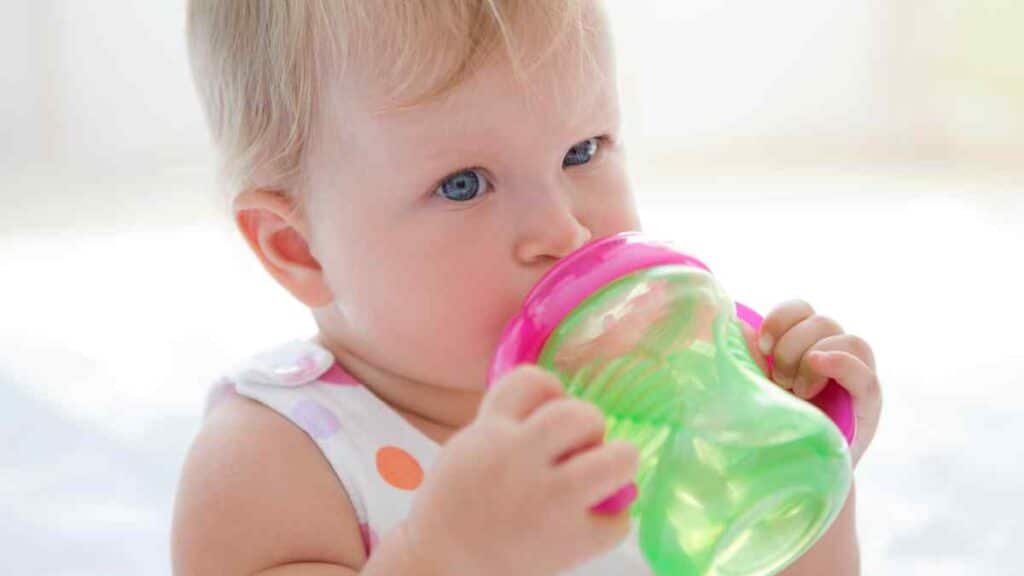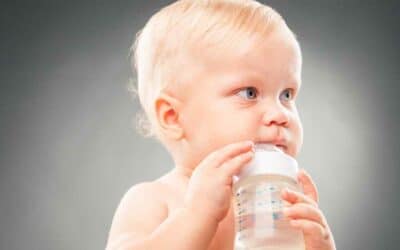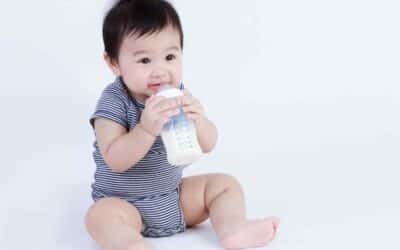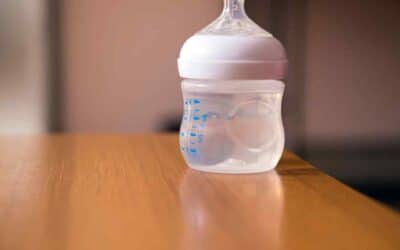Ensuring optimal hydration and nutrition for your baby is a top priority for every parent, and a crucial part of this involves choosing the right type of water. One such option is distilled water, a highly purified form that is free from contaminants and impurities. But what exactly are the benefits of distilled water when used for baby formula, and when should it be used?
In this article, we will discover more about the properties of distilled water, its advantages for infant health, and its role in baby nutrition. Whether you’re a new parent or have been navigating this journey for a while, this article will provide useful insights to help you make the best choices for your little one’s hydration and health. So, let’s dive in and explore the world of distilled water and its benefits for your baby.

Why Distilled Water is Safe for Babies
As parents, ensuring the safety and health of our babies is our paramount concern, especially regarding their nutrition and hydration. Distilled water, one of the purest forms of water, is a great option to consider for your baby’s needs. But why exactly is distilled water safe for babies? Let’s dive into the explanation.
The distillation process
Distilled water undergoes a thorough purification process known as distillation. This involves boiling the water and then condensing the steam back into a liquid form [1]. This process effectively removes several drinking water contaminants that could harm your baby, making distilled water one of the safest options for mixing baby formula.
Lack of contaminants
Unlike tap water, which can contain varying levels of contaminants depending on your local water supply, distilled water is free of common drinking water contaminants such as bacteria, viruses, heavy metals, and chemical pollutants. This purity makes distilled water a safe choice for your baby’s consumption.
Consistency
Bottled distilled water offers consistent quality, regardless of where or when you purchase it. Unlike tap water, the quality can vary significantly based on geographical location and local water treatment practices.
Suitable for formula preparation
Distilled water is ideal for preparing baby formula as it does not contain any minerals that might interfere with the nutrient content of the formula. However, it’s important to remember that because distilled bottled water is free of all minerals, prolonged exclusive consumption might require supplementation to ensure your baby is receiving all the necessary nutrients.
Comparison with other types of water
Distilled water is often compared to different types of water, like purified water, tap water, and nursery water, especially when used for baby formula. While these are also safe for babies, the distillation process provides a higher level of purification for bottled water, which can be especially beneficial if your baby has a sensitive digestive system or a compromised immune system.

Should You Use Purified or Distilled Water for Babies?
When transitioning from our previous discussion about the safety of distilled water for babies, it’s essential to consider another type of water commonly used for infants—purified water. Both purified and distilled water have undergone extensive treatment to remove contaminants, but they are not exactly the same. So, when it comes to baby formula preparation and drinking, which one should you choose?
Understanding Distilled Water
As discussed earlier, distilled water undergoes a rigorous distillation process that captures clean steam from boiling water and condenses it back into liquid. This process effectively removes most, if not all, contaminants. However, it also removes minerals naturally present in the water, resulting in a pure water source that may require mineral supplementation for long-term consumption.
Understanding Purified Water
Purified water has also undergone treatment to remove harmful contaminants. Various purification methods exist, such as reverse osmosis, deionization, and carbon filtration. These processes remove harmful and regulated contaminants, but unlike distillation, they may not eliminate all unknown contaminants.

Distilled vs. Purified Water for Baby Formula
Both purified and distilled water is safe for babies and can be used to prepare infant formula. The choice between the two often depends on the quality of your local tap water, personal preference, and your baby’s specific needs. However, distilled water’s extensive purification process might be a safer option if you are concerned about unknown contaminants that could have negatively affected countless children when used for baby formula.
Fluoride Content
Both distilled and purified water have low fluoride content compared to fluoridated tap water. If you are concerned about how much fluoride your baby consumes, either option would be suitable. However, remember that fluoride plays a critical role in dental health, and babies may need fluoride supplements if these types of water are used exclusively.
Availability and Cost
Bottled distilled and purified water for baby formula is widely available and relatively affordable. However, if cost is a concern, you might consider investing in home water purifiers or pure water distillers. Always remember to follow the manufacturer’s instructions to ensure the equipment is working effectively.
Blue Baby Syndrome
Nitrate contamination in drinking water can lead to a condition called methemoglobinemia, or Blue Baby Syndrome, which prevents red blood cells from carrying enough oxygen. Both distillation and purification methods effectively remove nitrates, making distilled and purified water safe options for your baby.

Practical Considerations for Using Distilled Water for Baby’s Formula
First and foremost, it’s important to note that babies drink distilled water. Distilled water is essentially pure water that has undergone a process of distillation, which involves boiling the water and then condensing the steam to remove impurities. This makes it free from contaminants and minerals that may be present in other types of water.
One of the main advantages of using distilled water for baby formula is its purity. By using distilled water, you can ensure that your baby is consuming water that is free from potentially harmful substances, such as lead, bacteria, or other contaminants that may be present in tap water. This can be especially important in areas where tap water quality is a concern or during boil alerts.
Another consideration is the presence of fluoride in water. While fluoride is beneficial for dental health in appropriate amounts, some parents prefer to limit their baby’s exposure to fluoride, especially before the eruption of teeth. Distilled water does not contain fluoride, making it a fluoride-free option for those who prefer it.
When using distilled water for baby formula, it’s essential to follow safe preparation practices. It is generally recommended to boil tap water before using it for formula preparation to ensure it is free from harmful bacteria. However, distilled water is already purified and does not require additional boiling. You can use distilled water directly from the container for mixing formula, saving you time and effort.
It is worth noting that distilled water lacks minerals that may be present in other types of water. While this is generally not a concern for healthy babies, some argue that the absence of these minerals may make distilled water slightly less preferable for long-term consumption. However, it’s important to remember that breast milk or formula already provides the necessary nutrients for your baby’s growth and development, and any additional minerals can be obtained through solid foods when the time is appropriate.
Pure water distillers, available in the market, can be used to produce distilled water at home, ensuring a constant supply for formula preparation. These distillers are designed to remove impurities effectively and can be a convenient option for parents who prefer to have control over the water quality.

Is It Safe to Use Distilled Water for Your Baby?
Besides breast milk, many pediatricians consider distilled water to be among the safest water sources for a baby, especially if breastfeeding for more than six months. It’s also one of the purest forms of water, primarily produced by the steam collected once it reaches its boiling point. It’s then cooled off until it transforms to liquid, ensuring that 99.99% of harmful germs and impurities are removed.
Distilled water is an even better alternative to tap water, mainly because the distillation process eliminates various minerals, including fluoride. Most tap water sources contain fluoride, a mineral that, if exposed in high amounts, could cause your child to develop white lines on their teeth. Meanwhile, to address your child’s need for fluoride, your child’s doctor would advise you to get fluoride supplements to prevent tooth decay.
Many bottled baby water brands these days are made especially for infants. These companies follow strict guidelines to ensure the water goes through a boiling sterilization process before being bottled.
How to Keep Your Baby Hydrated

Typically, you must give your child access to drinking plain water to keep them hydrated. However, there are times when kids tend to act out, making it challenging to keep them adequately hydrated even with their favorite baby drinks. So, if you find encouraging your baby to drink water difficult, here are a few tips you can consider.
Frequent Sips are Advisable
Besides a dilute formula of cow’s milk, one effective way to let them stay hydrated is to offer small amounts of water throughout the day. You don’t need to ask them to drink 8 ounces of bottled water at once. Even a few sips from their sippy cup can already help. Meanwhile, if you want to try out diluted fruit juice, it’s highly advisable to limit their intake to 4 ounces daily, especially if you’re transitioning from breast milk or formula.
Capture Their Attention
Another way to encourage your child to drink baby water is by capturing their interest with creativity. You can make the entire process fun by introducing them to various shapes and colors. Consider using colorful straws or cups shaped like their favorite cartoon characters to get them excited.
Consider Their Activities
Children don’t have the same capability to regulate their body temperature as adults. So it’ll be much more challenging for them to cool off, especially when exposed to the hot weather or strenuous activities.
It’s essential to keep them hydrated before and after each activity. It’s best to encourage them to drink fluids during exercise. As a general rule, letting babies drink the water of 4 ounces every 20 minutes is a must. It’s a general rule to give them all the hydration without water intoxication.
Introduce Liquid Foods
Besides encouraging your child to eat solids, you can also start introducing your kids to water-rich foods after one year of age as you transition from breast milk or formula. It can be as simple as juices from undiluted fruit juice such as apples, grapes, oranges. You can also consider giving them flavor water or naturally sweetened drinks from lemon or cucumber! It’s an excellent choice if you want to let babies drink water independently.
Telltale Signs of Infant Dehydration

It’s only standard for a parent to get worried about their baby, especially if they notice signs of dehydration. So, here are a few symptoms of infant dehydration to serve as a guide. If you see any of these signs, it’s best to get in touch with your pediatrician.
- Fewer diaper changes compared to previous days/ lack of wet diapers
- Showing increased signs of exhaustion
- Sunken fontanelle, or the soft spot located on the infant’s head
- Dry mouth
- There aren’t any tears when the baby is crying
Conclusion
In conclusion, distilled water offers several benefits for babies when it comes to drinking water and preparing their formula. It is considered one of the healthiest drinking water options available. Unlike treated tap water, which may contain impurities and minerals, distilled water goes through a process that removes contaminants, ensuring a pure and clean water source.
Babies can indeed drink distilled water, and it can be used by itself for formula preparation. This eliminates the need to boil tap water, saving time and effort for parents. Purified water, including distilled water, is generally safe for babies to consume, provided it meets the necessary quality standards.
It’s important to note that there are products marketed as “baby water” or “nursery water,” but these are typically purified or treated waters, not necessarily distilled. It’s essential to read the labels and understand the water’s composition before making a decision. If fluoride-free and contaminant-free water is desired, opting for distilled water can be a reliable choice.
Did this article help you? Let us know by leaving a comment. Have a question? Let us know in the comments.



